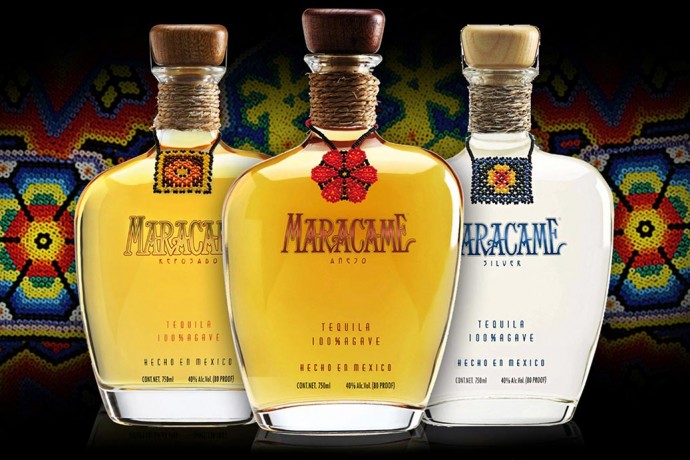It’s one thing to make award-winning spirits, but few brands manage to do so while keeping in touch with their roots. Maracame Tequila, which has taken off after truly impressive showings at this year’s spirit competitions, is a company that goes out of its way to give back to the people and ecosystem of its home.
Maracame is a recent entry to the the US and Mexican markets, but it has started to show up on the radar of bartenders and tequila enthusiasts after each of their three offerings was awarded scores in the mid-90s by the International Review of Spirits earlier this year.
In addition to that important seal of approval, Maracame won double gold, gold, and silver medals with their añejo, silver, and reposado varieties respectively at the 2015 San Francisco World Spirits Competition. Beyond wanting to produce high-quality premium tequila, though, Maracame has a strong connection to the Huichol people, the Native Mexicans who inhabit the region where their spirits are produced.
The Huichol
The Huichol (or Wixáritari) have lived deep in the expansive mountains of central Mexico for at least 15,000 years. Once a year, some Huichol (led by their shaman the Maracame, from whom the spirit takes its name) journey to their ancestral homeland of San Luís Potosí to perform “Mitote” Peyote ceremonies.
Springing from these ceremonies, as well as the religious and cultural history of the people, is an impressive tradition of beaded artwork that takes the shape of elaborate and colorful murals and figurines. This artwork adorns every bottle of Maracame tequila in the form of a small, unique, handmade medallion.
Maracame believes that helping the Huichol enrich their communities economically is tied directly to their mission, and they promise that “all funds derived from the production of Huichol art and craftwork, used to market and sell Maracame Tequila, go directly to the Huichol community.”
The Tequila
The brand produces their plata, reposado, and añejo tequilas at the Casa Camarena distillery in Arandas, an area of Jalisco that is nestled in the highlands of the Sierra Madre Occidental range where elevations average over 7,000 feet. Agave grown in this region are exposed to cooler nights and colder winters than those in the lowlands, and produce a slightly more delicate and floral honey.
Maracame is double distilled, and a very small heart cut of the product is reserved for the second and final distillation. It harkens back to traditional methods of tequila production, and operates more like a craft distillery you’d find in the States than a typical large, international producer that might cut corners to increase their output.
Although each variety has a complex flavor that is perfect to sip at room temperature, Maracame works extremely well as the backbone of traditional and modern tequila cocktails. The silver (or plata, or blanco, or whatever you prefer to call it) tequila makes a light and balanced Margarita that’s creamy and sweet.
Maracame añejo pairs well with tobacco flavors and nut- and fruit-based cordials, and has a rich caramel flavor that is somewhat peppery.
“We find that whiskey drinkers really love our añejo,” says Charlie McKenna of Global Beverage Team, the firm representing Maracame in the US. Bevvy caught up with Charlie and his partner in crime Maria Soto during a tasting sponsored by the San Francisco World Spirits Competition.
They’ve been touring the country this fall, spreading the gospel of Maracame to the industry professionals and enthusiasts who’ve come out of the woodwork to try this year’s double gold winners. Reactions to the añejo have been overwhelmingly positive according to the pair, and for good reason. It’s subtle and sweet, with nearly no harsh bite. There are flavors of stone fruit and pepper, and the finish is short and characterized by a light smokiness and a strong sensation of caramel and oak.
The Land
The producers of Maracame not only take extreme care in crafting the flavors of their tequila, they are also heavily invested in the environment from which their brand originates. The distillery is committed to a zero-waste philosophy that sees any by-products further recycled or repurposed. The program, called Zero D, ensures that Maracame is produced in line with Huichol values of caring for and respecting the land from which the agave are harvested.
Engineers at Casa Camarena devised this system, which evaporates the vinaza (essentially waste products) from the distillation and extracts it as a mineral-rich solid that is then used to fertilize new fields of blue agave. Additionally, the distillery uses natural composting methods, and allows each of its fields to sit fallow for one year between growing periods to ensure the land is viable for sustainable production.
Casa Camarena is one of Mexico’s longest-operating tequila producers. The Camarenas, a family of Spanish immigrants, helped found the town of Arandas in the mid-18th century and spent three generations working in the fields of Jalisco before distilling their first tequila in 1938. Today, headed by the matriarch of the family, Doña Elena Herrera Orendain (the great great granddaughter of the famous Don Jose Cuervo, interestingly enough), Camarena produces over three million blue agave annually.
Each aspect of the Maracame brand represents an ethically-focused approach to production that seems to be resonating with drinkers and industry professionals across the board. It’s something Maria Soto has had great pleasure witnessing herself, saying that as people take their first sip, “we tell them the dedication the Camarenas have to giving back to the community. We tell them that the medallion on each bottle is the symbol of the Peyote that the indigenous Huichol use in their religious ceremonies, and it really resonates with them. It’s amazing to see.”
Currently, Maracame is only available in the United States in Chicago or through their website directly. After the fairly massive success the brand has experienced in 2015, though, that’s sure to change soon.



